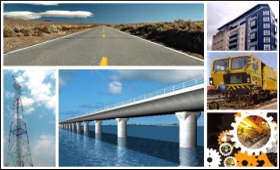|
|
|

|
Savings and infrastructure in the post Covid-19 world
|
|

|
|
| Top Stories |
 |
|
|
|
Taponeel Mukherjee | 27 Apr, 2020
As we see even more of the global impact of the Covid-19 outbreak on
healthcare and economics, a healthcare and financial catastrophe of such
magnitude will impact current economic and financial trends and create
new ones as well. From an Indian perspective, it would be prudent to
watch out on three issues that will impact the Indian economy and
deserve vital attention.
Firstly, given the plunge in global
nominal yields with the ten-year US treasury yielding south of seventy
basis points the requirement for returns or relatively higher-yielding
assets, will be exacerbated in short to medium term. More specifically,
the demand for real assets such as infrastructure assets will see
further growth. Investors, pension funds, insurance companies and indeed
all savers globally will require access to real assets, especially in
the infrastructure space, that can generate cash flows to meet the
target rate needed in the face of plunging yields all around.
The
impact of Covid-19 will lead to further slowing down in growth in the
near future, which will mean interest rates will remain lower for quite
some time now. The world will look towards younger countries such as
India to potentially create assets that can help meet the demand from
local growth, while also providing investment avenues for savers. While
the demand growth is contingent upon a gradual recovery in India, an
opportunity to invest in Indian infrastructure will be even more
critical for the global investment community moving forward.
For
India, clearing the clutter in the infrastructure space to allow savings
and investment pools to finance the assets will be the key to bridging
the infrastructure financing gap. Mainly, in a world with collapsing
returns, especially in the fixed income space, the next few years will
provide opportunities to attract both domestic and global savings.
Clarity in policy and expedited conflict resolution as the hallmarks of
the new Indian infrastructure age are what is needed.
Secondly,
we must realise that while liquidity and a higher quantum of money flow
are essential drivers of economic growth, especially given both the
demand and supply shocks from the Covid-19, productive usage of the
additional capital is, if not more, as important. As the RBI expands
liquidity in the system, to assess the impact one needs patience.
Prudence in lending, especially with the hangover of NPAs, is much
needed. While providing credit to a highly constrained economy is the
lifeline, credit availability must not be at the cost of credit quality.
Otherwise, we risk even greater problems from an avalanche of NPAs, a
situation that is avoidable at all costs. Credit demand will see a
pickup, however, only as consumer demand picks up and more importantly,
the future path of action has greater clarity.
Thirdly, the
recent happenings of a large mutual fund company in India shutting down
certain debt funds once again bring to the focus the issue for investor
suitability, liquidity and investor education in the context of the
retail investment landscape in India. Balancing the need to provide
savers with avenues to deploy their savings and allowing corporates to
utilise the capital for productive use is both important and a desired
underpinning of the modern economy. However, what needs additional focus
in the years ahead is whether funds that invest in relatively illiquid
corporate credit can provide short-term liquidity to their investors.
Essentially,
investor suitability and investor education must be underscored. If a
debt fund pays 200 basis points more than a bank FD, the question is:
does that make the debt-fund a better investment option for the
investor? Retail investors must understand that spread differentials
must compensate them for the additional risk taken, and so on. Overall,
providing market infrastructure that improves liquidity and pricing of
credit in the market along with greater investor education constitute
the vital components of further building the credit markets in India.
Effective
mobilisation of savings into productive usage of capital must be the
mantra for the Indian economy going forward. The Covid-19 outbreak has
been a tragedy, but as we emerge from this tragedy India's capacity to
offer attractive risk-adjusted returns on real assets and get its credit
markets in order, will be crucial drivers of the economic growth that
is much needed. An environment that makes room for savings to craft the
much needed and critical infrastructure for assuring returns to savers
and growth prospects for businesses is the most optimal way the economic
wheels can deliver value. The current global environment offers India
an opportunity for a fresh start towards the coming decade.
|
|
|
| |
|
|
|
|
|
|
|
|
|
|
|
|
|
|
| |
| Customs Exchange Rates |
| Currency |
Import |
Export |
US Dollar
|
₹91.25
|
₹89.55 |
UK Pound
|
₹122.85
|
₹118.85 |
Euro
|
₹107.95
|
₹104.3 |
| Japanese
Yen |
₹59 |
₹57.1 |
| As on 29 Dec, 2025 |
|
|
| Daily Poll |
 |
 |
| What is your biggest hurdle to scaling right now? |
|
|
|
|
|
| Commented Stories |
 |
|
|
|
|
|
| |
|